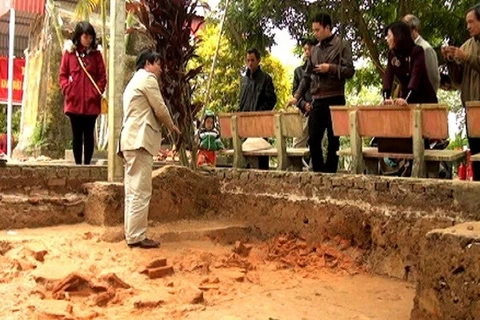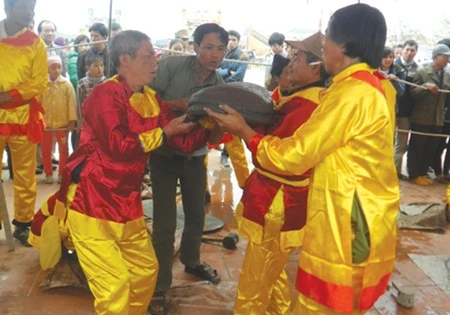 The Ngoc Lo palanquin parade returns to Tran temple festival after offering insence at Pho Minh Temple (Source: VNA)
The Ngoc Lo palanquin parade returns to Tran temple festival after offering insence at Pho Minh Temple (Source: VNA)
Nam Dinh (VNA) - The Ngoc Lo palanquin parade, one of the most vital rituals of Tran Temple Festival, was held on February 18 to pay tribute to ancestors.
The parade takes places on the 11th day of the first lunar month each year.
Nguyen Van Thu, Director of the Nam Dinh Museum, said the palanquin parade started at Pho Minh Pagoda (another name Thap Pagoda), place of worship of Zen master Emperor Tran Nhan Tong (1258-1308), the third ruler of the Tran Dynasty to Thien Truong Temple at Loc Vuong Ward.
“The children of the Tran Dynasty attend the ritual to show gratitude to their ancestors. It is also a symbol of acceptance and reconcilability of all religions and beliefs into one," said Thu, who is also a provincial culture researcher.
Historically, villages surrounding the northern province of Nam Dinh also participated in the festival at ancient Tran Temple. Today, the festival is organised solely by Tuc Mac Village.
Before the parade, a local man brings a bowl of incense from Tran Temple to the palanquin. The parade consists of flags, imperial equipage, an octet (the eight kinds of musical instruments), as well as a group of village patriarchs in brown long dress marching behind and reading mantra.
The parade was restored in 2015 with sufficient preparation for Tran Temple Festival.
According to national cultural researchers, the festival today was fully equipped with traditional rituals, and can be listed as a national intangible cultural heritage.
"The lasting Tran Temple Festival is for commemorating the origin of emperors of the Tran Dynasty and especially national heroes like Supreme Commander Tran Hung Dao, who led the Vietnam armies to repel three major Yuan-Mongol invasions in the 13th century," added Thu.-VNA
























